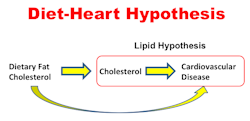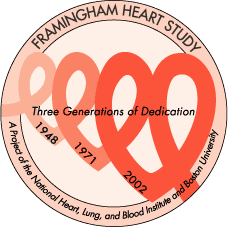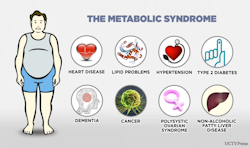The Great Cholesterol Debate
If HDL-Cholesterol is protective, we can call it "good cholesterol."
So LDL-Cholesterol is "bad" and almost everyone is prescribed a statin to reduce their CVD risk.
It's now well known that any effort to reduce cholesterol levels by diet cannot succeed. Your body produces it's own cholesterol independent of your diet.
The link between LDL-Cholesterol and CVD is tenuous. Both the Lyon Heart Study and the ![]() Women's Health Initiative show no effect of LDL-Cholesterol of CVD.
Women's Health Initiative show no effect of LDL-Cholesterol of CVD.
If there is any risk at all in LDL-Cholesterol, it arises from small dense particles it can carry.
No Change to Guidelines
The results of the Framingham Heart Study and The Women's Health Initiative, demonstrate that the hypothesis about the connection between your diet and your heart disease, the idea that saturated fat in the diet, creates high cholesterol and causes heart attacks is wrong. Besides, on a low-fat high-carbohydrate diet people were getting obese.
These results were unexpected. "We know we are right," remarked an astonished researcher. Yet, his results confirmed just the opposite, and therefore, that the Dietary Guidelines must be wrong. However, despite these results, no real change is offered, ![]() in 2010 or
in 2010 or ![]() 2015. Why is that?
2015. Why is that?
This is just my speculation: political considerations. The US Department of Agriculture has a large stake in what the recommendations are. US Agriculture is massively invested in grain production, particularly growing corn. That industry is being protected.
And: more political considerations. A diet low in carbohydrates is more expensive. There is a very big underclass in the USA, and the cost of food is a critical matter for politicians. They don't want a demand for higher incomes for purchasing healthy food to develop. The food currently recommended by the guidelines is relatively low cost.
Dr William Castelli, Director, Framingham Heart Study, 1992
"We found that the people who ate the most cholesterol, ate the most saturated fat, ate the most calories; weighed the least and were the most physically active."
End of the Cholesterol Myth
The Framingham Study was intended to produce the most conclusive evidence. The study began in 1948. By 1978, after 30 years this was the result.
| Men and Women | 205-264 mg/dL | No relationship | |
| Men | Less than 220 mg/dL | Increased risk | |
| Men | Mid-range mg/dL | Increased risk | |
| Men | Greater than 220 mg/dL | Decreased risk | |
So that's a total failure to prove that high total cholesterol causes heart attacks. More-over the evidence shows that at least for older men high total cholesterol might be protective.
The Framingham Heart Study
 The Framingham Heart Study began in 1948, which is early in the long saga or heart disease and strokes and what to do about it.
The Framingham Heart Study began in 1948, which is early in the long saga or heart disease and strokes and what to do about it.
The study provides a huge list of changing recommendations. Many of the ideas they began with have proven to be unwise of wrong. Here is a tiny selection.
Total Cholesterol

1961: Total Cholesterol is a good marker of future cardiovascular disease.
Saturated fat does increase total cholesterol, but that's not necessarily a problem.
1988: Higher HDL-Cholesterol reduces the risk of death.
High HDL-Cholesterol is protective of both the heart and the brain.
AND:
Low Total Cholesterol is linked to more cancer, poor circulation, poor verbal fluency and faulty abstract reasoning.
Total Cholesterol below 240mg/dl is related to greater mortality in women over 75.
In women between 56 and 75, the best long-term health was achieved when total cholesterol was between 240 and 280mg/dl.
Blood Pressure
1970: High Blood Pressure increases the risk of strokes.
1996: High Blood Pressure increases the rate of cardiovascular disease.
2002: The lifetime risk of developing high blood pressure is 9:10.
Stroke Risk
1970: High Blood Pressure increases the risk of strokes.
1970: Atrial fibrillation increases stroke risk 5-fold.
1997: People who ate more saturated fats have fewer strokes. (Really surprising.)
2010: Sleep apnea tied to increased risk of stroke.
2010: Evidence that occurrence of stroke by age 65 years in a parent increased risk of stroke in offspring by 3-fold.
Obesity
 2005: The lifetime risk of being obese exceeds 70%. (Are the Guidelines Suspect?)
2005: The lifetime risk of being obese exceeds 70%. (Are the Guidelines Suspect?)
2007: Social networks and social connections influence obesity rates.
There is no relationship between dietary saturated fat and heart disease.
Heart Disease Risk
1961: ![]() Total Cholesterol is a good marker of future cardiovascular disease.
Total Cholesterol is a good marker of future cardiovascular disease.
1976: Menopause found to increase the risk of heart disease.
High HDL-Cholesterol is protective of both the heart and the brain.
1996: High Blood Pressure increases the rate of cardiovascular disease.
1998: Atrial fibrillation is associated with an increased risk of all-cause mortality.
There is no relationship between dietary saturated fat and heart disease. (Surprise?)
There is no relationship between diet and Cardiovascular disease. (Result buried for years.)
Smoking
1960: Cigarette smoking found to increase the risk of heart disease.
2008: Social networks are a key influence in stopping smoking.
Smoking and obesity are not related.
Alzheimer's Disease
2009: High leptin levels may protect against ![]() Alzheimer's disease.
Alzheimer's disease.
2010: Fat around the abdomen associated with smaller, older brains in middle-aged adults.
